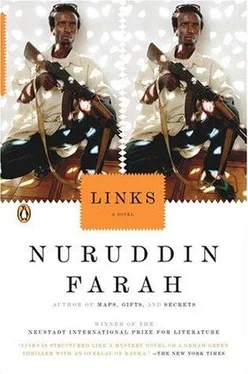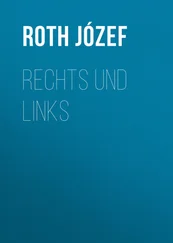Makka was repeating something over and over. Eventually Jeebleh figured out the word: “Perform!” He saw that Faahiye and Raasta were both seated and waiting for Makka’s performance to start. Smiling all the while, Makka might have been a girl taking pride in her acrobatic skills, showing off what she could do, feats she had seen on television, Jeebleh guessed. When she was done and everyone applauded, Makka was over the moon.
A few minutes later, Jeebleh heard the sounds of a television from upstairs. His memory took him back to his visit to Caloosha’s, and the sound of soaps coming from an upstairs room. Understandably, he didn’t wish to know more than he ought to, or to get involved in matters that weren’t his concern. He looked away, embarrassed, and his evasive gaze settled on a lemon tree in the garden, gorgeously committed to holding what there was of the sun in its leaves.
“I KNOW EVERYTHING ABOUT YOU!” RAASTA SAID.
She was to Makka like a parent to an infant, and she set about organizing a play corner where Makka could keep herself occupied, as a parent wanting to speak to her peers about something important might do. She placed a box of beads close to Makka, who wore a single talismanic bead, blue, around her neck. Makka contentedly started stringing beads together. Faahiye made himself scarce, evidently to tidy up.
“I’ve heard a lot about you, from Uncle Bile, and you’ve been with me for a long, long time, from my birth. Now I know your face, and I’m very glad.”
Jeebleh didn’t know what to say. The questions gathering in his head were growing unruly, tripping over one another, each insisting on being given precedence. The sound of his breathing made him think of a door bolt going home. He fussed at his eye, cleaning it. Finally he said, “I know very little about you!”
“There is time yet,” she said. “There is!”
His breathing strained under the tension he felt. The firearm became obtrusive, weighing even more heavily on him. He didn’t dare remove it, lest she should see it. Who knows, she might run off, and not want to see him ever again. He didn’t want that to happen. Finally he was able to formulate a question: “How have you been?”
“We are good,” she said.
“Are you fed well?”
“Better than most.”
He asked tentatively, “Are things better now?”
“Things have been better in the last two days.”
“Because Daddy is back?”
“They’ve been kinder, since his return.”
“Who are ‘they’?”
Jeebleh could sense her instant withdrawal. Her eyes shamefully downcast, she said, “I am not sure.”
“Who is the person upstairs?”
“A woman,” she said.
“A woman?”
“She cooks for us, looks after us. Washes our clothes, makes up our beds, cleans after us. We found her here. She says little, and does what we tell her to.”
“Will you miss her?”
“No,” Raasta said. “I miss Uncle Bile, I miss my mother, I miss Uncle Seamus.”
She was a formidable girl, able to draw you into her comfort-giving world against your better judgment, if she chose to. He had fallen under her spell right away, because, he reasoned, she was accustomed to being loved, trusted, and obeyed. Looking at her now, and imagining the horrid things that she had been through, not to mention the uncertainties she had lived with as a kidnapping victim, Jeebleh was impressed with her perseverance, her noble bearing for one so young. Her clothes were almost rags, and so were Makka’s. Raasta had presumably outgrown hers, and yet she appeared impervious to the state of her clothing, like a duck getting wet in a tropical downpour.
She lapsed into a reflective mood, and withdrew into a private space he was in no position to reach. Jeebleh imagined her to be tough in the self-protective way of a tortoise withdrawing its softer head and legs. Was she thinking through her troubled thoughts? It would be unwise to push her, to try to make her speak. He should give her time, so that the trauma of being held prisoner might melt away. He would let her find peace in her silence, if that was what she was after. He said, “Everything will be all right.”
“I am beginning to think so too,” she replied, eagerly but absently, as tears appeared in her eyes.
Like all exceptional persons, no matter what their age or disposition, she was as prepared to show her strengths and perseverance as she was willing to demonstrate her weaknesses. And so when it came to weeping, she did so discreetly and undemonstratively, as a mother might in the presence of her child. This grown-up behavior too impressed Jeebleh.
“Shall we go?” she said.
“Where?”
“Home.”
Jeebleh didn’t know what answer to give. He was not sure whether Faahiye had up-to-the-minute instructions as to what he might or might not do, and did not know what their fates would be if they tried to leave. Nor had he any idea with whom Faahiye dealt, whether communications were by mobile phone, in dribs and drabs, on a need-to-know basis, or in person, direct from the head of the conspiracy. “Let’s ask your daddy,” he suggested.
“Let’s,” she said, and was just about to shout and ask whether it was okay to go home, back to her mother, Uncle Bile, and Uncle Seamus, when a ruckus was raised outside.
It was the kind of sound that might have been created by a rutting he-donkey chasing a she-donkey up and down a stone-filled alleyway. It ranked with the hideous racket Jeebleh remembered Italian youths making on their motorcycles through the streets of Padua at siesta time. How were the two girls coping? Raasta, out of sympathy, went to Makka’s play corner to hold her in a comforting embrace, to assure her that all would be well, not to worry. When Faahiye asked what on earth was going on, Jeebleh, because he had a firearm, volunteered to find out. He stood beside a window, weapon in hand, ready to put it to use.
Faahiye stayed behind with the girls.
Glancing up the stairs to the second floor, Jeebleh heard that the television had just been switched off. He was tempted to ask who was there, but he chose instead to devote what energy he had to discovering the cause of the ruckus, which showed no signs of letting up.
But he was relieved now to see who was making the noise — Qasiir, armed and Stetsoned, in a car with three of his mates, two of them armed, the other at the wheel. The car was a collectible Ford, a flivver most likely left behind by an American or a European seconded to UNOSOM. Tied to the back, dragging along behind, were several empty tin cans. As soon as Qasiir spotted Jeebleh, who was on the porch, waving, the car stopped, and so did the unearthly noise. “It’s only me and my friends,” Qasiir said. “This is fun — but maybe not as much as you’re having. Look at your haircut — cool! Are you all right? How are the girls?”
Again, Clint Eastwood to the rescue. “What a delightful young man,” Jeebleh told Faahiye, who had joined him. He put the firearm away, smiling, and noticed the stale sweat staining the armpits of Faahiye’s dark shirt. Jeebleh’s face was now daubed with relief.
He waited for Qasiir and his friends to get out of the car before asking how they had traced them to the house. Qasiir and another of the youths were busy untying the cans from the car, when two more vehicles came into view. Jeebleh assumed he and Faahiye were now in trouble; here was the head of the conspiracy come to put an end to the insurgency, they wouldn’t be allowed to leave with the girls. Hope drained out of him. But Qasiir called out: “No need to worry. It’s only Grandpa, our backup!”
The first car contained Dajaal and a driver. In the second, a battlewagon, were some seven or eight youths with machine guns and rocket launchers. Kaahin was up front, next to the youth at the wheel. Dajaal and Kaahin got out of their respective vehicles and remained where they were, poised to deal with any problem that might come up the road.
Читать дальше












